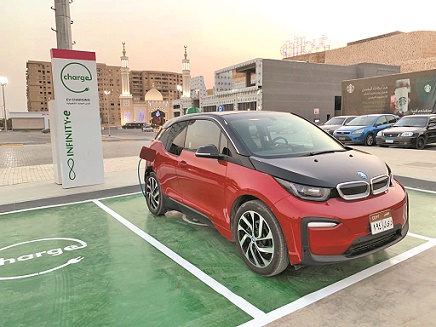Electric Cars: A New Era for Global Manufacturing
As the world shifts towards green energy, the electric vehicle industry becomes a fiercely contested space, reshaping economies and industrial landscapes globally.
Published May 19, 2024 - 00:05am

Image recovered from shorouknews.com
Egypt has witnessed a surge in the number of electric vehicles, reaching 10,000 compared to about 3,000 in the previous year, according to Ahmed Zain, president of the Clean Energy Vehicles Committee. Zain highlighted that the favorable tax and customs incentives are encouraging this growth. Despite the advancements, the limited number of charging stations remains a challenge for widespread adoption of electric vehicles in the country.
Similarly, in the US, President Biden's trade policies, potentially increasing tariffs on Chinese electric vehicles, signal a push for expanding domestic green technology production. Analysts suggest these measures could backfire, potentially impeding the industrial transition desired by the Biden administration.
In Morocco, the kingdom is poised to become a central player in electric vehicle manufacturing, exploiting its strategic geography and abundant natural resources essential for the industry, posing a silent threat to Spain's dominance in this field.
Moreover, a significant drop of 43% in car sales in Egypt has been reported in the first quarter of the current year due to factors such as a rise in the dollar exchange rate and import restrictions.
Finally, a small, well-made, and low-cost Chinese electric vehicle known as 'Seagull' poses a threat to American car companies. The rapid emergence of affordable electric cars from China may revolutionize the global automotive industry in ways unseen since the advent of Japanese automakers in the 1970s.
The figures presented by Ahmed Zain are indicative of Egypt's commitment to transitioning to more environmentally friendly transportation options. The government's support in the form of financial enticements has played a pivotal role in this shift. Electric car buyers in Egypt benefit from significant cuts to taxes and customs duties, which can add up to a 29% reduction in costs compared to traditional cars. These savings are persuading more consumers to consider electric vehicles as a viable alternative. Moreover, Egypt is planning to implement new regulations to support the infrastructure for electric cars, including the widespread installation of charging stations.
Nevertheless, the country still grapples with the challenge of establishing a comprehensive network of charging stations to facilitate a seamless transition to electric mobility. With only a limited number of charging units available across the country, mainstream acceptance of electric vehicles is hampered. To address this, the Egyptian government is cooperating with private sector companies to enhance the charging infrastructure and is looking into the construction of solar-powered stations to ensure sustainability.
Turning to the developments in the US, the Biden administration's focus on bolstering domestic production of electric vehicles might create contractionary effects on the availability and pricing of these environmentally friendly cars. The prospect of increased tariffs on imports, including Chinese electric vehicles, risks constraining the variety and affordability of electric vehicles for American consumers, which may in turn slow down the switch from conventional combustion engines.
However, these policies also open the door for the US to build a robust electric vehicle industry at home. The government's strategic initiatives, such as investing billions in battery production and electric vehicle manufacturing, aim to create jobs and reduce dependency on imports, furthering the nation's environmental goals and economic independence. This could ultimately enhance the competitiveness of American-made electric vehicles both domestically and internationally.
Morocco's growing stature in the electric vehicle manufacturing space underscores the dynamic changes occurring within the auto industry. The country's advancements are not happening in isolation and pose a significant challenge to neighboring Spain and other established auto manufacturers in Europe. Situated close to European markets, Morocco has developed modern automotive factories, attracted foreign investments, and leveraged its reserves of vital minerals, like phosphates, used in batteries for electric vehicles. This approach mirrors the broader trend of emerging economies positioning themselves as important stakeholders in the green revolution.
The reported decline in car sales in Egypt accents the diverse economic pressures consumers are facing. A combination of increasing costs due to higher exchange rates and restrictive import policies have made new cars less attainable for many Egyptians. This slowdown in sales reflects broader economic trends and provides a window into the changing dynamics of consumer behavior, which has potential longer-term implications for the Egyptian automotive market.
The emergence of the 'Seagull', a cost-effective Chinese electric vehicle, has indeed raised eyebrows across the international automotive sector. Offering a combination of affordability and functionality, this small electric vehicle has the potential to replicate the disruptive impact that Japanese carmakers had decades ago. The car's competitive pricing may well entice consumers who are price-sensitive and could accelerate the adoption of electric vehicles worldwide. American car companies are now faced with the need to innovate and adapt to maintain their market position in the face of such growing global competition.
In summation, the global automotive industry is at a pivotal crossroads, with electric vehicles at the forefront of this transformation. From Egypt's policy-driven growth in electric vehicle usage to the strategic shifts in the US and the ascent of Morocco's manufacturing capabilities, the landscape is evolving swiftly. Moreover, the market dynamics exemplified by the new Chinese entrants demonstrate the agility required to stay competitive in this burgeoning sector. This confluence of developments across different countries underlines the multifaceted nature of the electric vehicle revolution and its sweeping economic and environmental implications.







